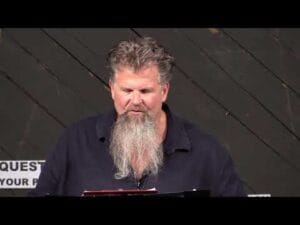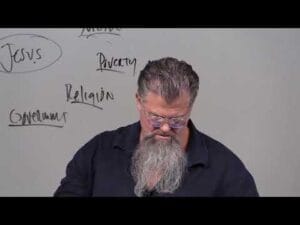
Galatians 5:15-26 Bible Teaching
Paul's letter to the Galatians stresses love as law's fulfillment, warns against church conflict, and promotes walking in the Spirit over fleshly desires for unity and growth.

Paul's letter to the Galatians stresses love as law's fulfillment, warns against church conflict, and promotes walking in the Spirit over fleshly desires for unity and growth.

Jesus, rejected in Nazareth, illustrates prophets' lack of acceptance at home. In Capernaum, He teaches with authority, performs miracles, and is recognized by demons as the "Holy One of God," challenging traditional Trinity views. His acts fulfill Isaiah's prophecy, emphasizing His role as the source of healing and liberation.

Jesus, filled with the Spirit, began his ministry in Galilee, proclaiming Isaiah's prophecy fulfillment. Despite admiration, he faced rejection in Nazareth, emphasizing "no prophet is accepted in his own country." His mission was to preach, heal, and liberate, focusing on spiritual redemption over material solutions.

Shawn's teaching focuses on faith expressed through love, warns against legalism, emphasizes doctrinal purity, and highlights freedom in Christ to serve others with love.

Jesus, filled with the Holy Spirit, fasts 40 days, resists Satan's temptations using scripture, emphasizing spiritual over physical sustenance, and prioritizing God's will.

Faith in Christianity is belief in unseen hopes, distinct from works. True faith leads to action; faith without works is ineffective. Salvation is by grace, faith shown by love-driven deeds.

Faith in Christ, not adherence to Jewish law, is key to salvation. True faith expresses itself through love, rejecting legalism. Justification comes through faith, not works.

The teaching highlights Jesus as the baptizer with the Holy Spirit and fire, symbolizing judgment and spiritual cleansing. It contrasts Jesus' divine sonship with Adam's failure, marking a new era of peace and righteousness. Genealogies in Matthew and Luke affirm Jesus' Davidic lineage, emphasizing his role as Messiah.

Paul contrasts Hagar and Sarah to illustrate two covenants: bondage under the Law vs. freedom in Christ. Believers are spiritual descendants of Sarah, embracing liberty and love.

John the Baptist emphasized genuine repentance, ethical living, and actionable deeds, contrasting with Jesus' faith-based baptism. He warned against relying on lineage and rituals.

Shawn's teaching highlights Jesus' spiritual growth, wisdom at age 12 in the temple, his divine mission, and universal redemption through his sacrificial death.

Human relationships are fragile; love unconditionally, speak truth, trust God. Avoid self-aggrandizement, focus on Christ. Paul contrasts law's bondage with Gospel's freedom.

Believers are redeemed and adopted as God's children through faith in Christ, receiving the Holy Spirit. Paul warns against returning to the law, advocating for spiritual freedom.

Shawn's teaching distinguishes "logos" as God's complete message and "rhema" as specific revelations. It explores biblical translation nuances, Jewish customs, and Jesus' early life, emphasizing historical evidence and prophecy fulfillment.

Shawn's teaching highlights Jesus's birth in Bethlehem, fulfilling prophecy, emphasizing humility, spiritual significance, and universal redemption, contrasting humble shepherds with elites.

Believers become God's children through faith, symbolized by baptism, transitioning from law to grace. Spiritual maturity, not ethnicity or status, defines true sonship.

Mary's Magnificat praises God's mercy and justice, highlighting humility and divine favor. John the Baptist's naming and role emphasize salvation and prophecy fulfillment.

Paul's teaching in Galatians highlights the law's role as a guide to Christ, emphasizing faith over law for salvation, applicable to all, and spiritual adoption through faith.

Mary's conception of Jesus via the Holy Spirit emphasizes Jesus' sinless birth, challenging original sin. Focus on scriptural prophecy, virgin birth, and Jesus' dual nature.

Shawn argues Jesus was a sin-offering, not sinful. Faith, not law, justifies believers. Paul sees Christ as Abraham's promise fulfillment. Law highlights sin, guides to Christ.